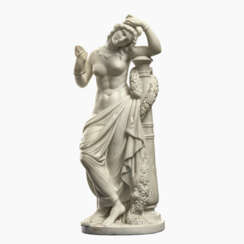ludwig michael schwanthaler (1802 - 1848)
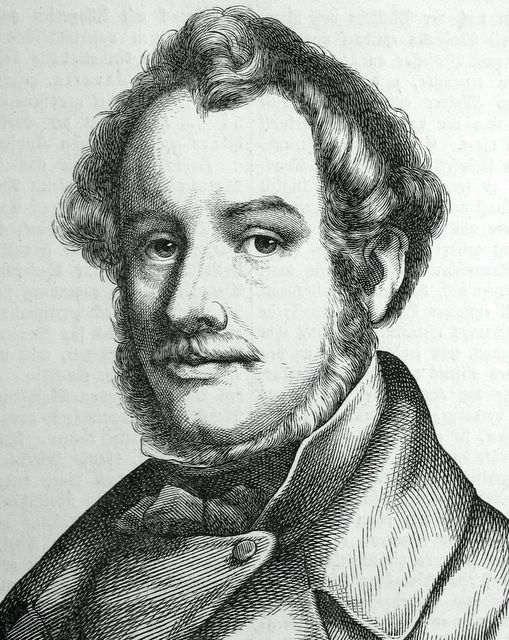
Ludwig Michael Schwanthaler, ennobled as Ritter von Schwanthaler, was a Bavarian sculptor and a key figure in the Classical movement in southern Germany. He was born on 26 August 1802 in Munich to a family that had been involved in sculpture for centuries.
Schwanthaler's journey began under his father's tutelage before he formally trained at the Munich Academy. His talent was so profound that he received commissions from royalty and mentorship from the likes of Peter von Cornelius. He further honed his skills in Rome, where he was influenced by Bertel Thorvaldsen. Returning to Munich, Schwanthaler met the demands for sculpture head-on, collaborating with architects and painters to revive the arts in Bavaria.
Among his many works, the statues in the Neues Palais and the figures in the Alte Pinakothek are notable. His versatility also shone in sacred art, with his contributions to St Ludwig and St Mariahilf churches. The Ruhmeshalle's metopes and the monumental Bavaria statue demonstrate his artistic bravery. Schwanthaler's life was dedicated to his craft, and upon his death on November 14, 1848, he bequeathed his models and studies to the Munich Academy, forming the Schwanthaler Museum.
For art enthusiasts, Schwanthaler's legacy offers a deep dive into classical sculpture's golden age. His works remain a testament to the neoclassical aesthetic and are celebrated for their historical and artistic significance.
Engage with the grandeur of Schwanthaler's art by signing up for updates, and take part in preserving the memory of one of Bavaria's master sculptors.
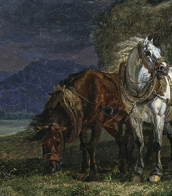

Ludwig Michael Schwanthaler, ennobled as Ritter von Schwanthaler, was a Bavarian sculptor and a key figure in the Classical movement in southern Germany. He was born on 26 August 1802 in Munich to a family that had been involved in sculpture for centuries.
Schwanthaler's journey began under his father's tutelage before he formally trained at the Munich Academy. His talent was so profound that he received commissions from royalty and mentorship from the likes of Peter von Cornelius. He further honed his skills in Rome, where he was influenced by Bertel Thorvaldsen. Returning to Munich, Schwanthaler met the demands for sculpture head-on, collaborating with architects and painters to revive the arts in Bavaria.
Among his many works, the statues in the Neues Palais and the figures in the Alte Pinakothek are notable. His versatility also shone in sacred art, with his contributions to St Ludwig and St Mariahilf churches. The Ruhmeshalle's metopes and the monumental Bavaria statue demonstrate his artistic bravery. Schwanthaler's life was dedicated to his craft, and upon his death on November 14, 1848, he bequeathed his models and studies to the Munich Academy, forming the Schwanthaler Museum.
For art enthusiasts, Schwanthaler's legacy offers a deep dive into classical sculpture's golden age. His works remain a testament to the neoclassical aesthetic and are celebrated for their historical and artistic significance.
Engage with the grandeur of Schwanthaler's art by signing up for updates, and take part in preserving the memory of one of Bavaria's master sculptors.
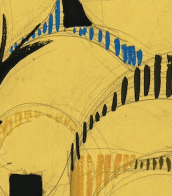

Ludwig Michael Schwanthaler, ennobled as Ritter von Schwanthaler, was a Bavarian sculptor and a key figure in the Classical movement in southern Germany. He was born on 26 August 1802 in Munich to a family that had been involved in sculpture for centuries.
Schwanthaler's journey began under his father's tutelage before he formally trained at the Munich Academy. His talent was so profound that he received commissions from royalty and mentorship from the likes of Peter von Cornelius. He further honed his skills in Rome, where he was influenced by Bertel Thorvaldsen. Returning to Munich, Schwanthaler met the demands for sculpture head-on, collaborating with architects and painters to revive the arts in Bavaria.
Among his many works, the statues in the Neues Palais and the figures in the Alte Pinakothek are notable. His versatility also shone in sacred art, with his contributions to St Ludwig and St Mariahilf churches. The Ruhmeshalle's metopes and the monumental Bavaria statue demonstrate his artistic bravery. Schwanthaler's life was dedicated to his craft, and upon his death on November 14, 1848, he bequeathed his models and studies to the Munich Academy, forming the Schwanthaler Museum.
For art enthusiasts, Schwanthaler's legacy offers a deep dive into classical sculpture's golden age. His works remain a testament to the neoclassical aesthetic and are celebrated for their historical and artistic significance.
Engage with the grandeur of Schwanthaler's art by signing up for updates, and take part in preserving the memory of one of Bavaria's master sculptors.


Ludwig Michael Schwanthaler, ennobled as Ritter von Schwanthaler, was a Bavarian sculptor and a key figure in the Classical movement in southern Germany. He was born on 26 August 1802 in Munich to a family that had been involved in sculpture for centuries.
Schwanthaler's journey began under his father's tutelage before he formally trained at the Munich Academy. His talent was so profound that he received commissions from royalty and mentorship from the likes of Peter von Cornelius. He further honed his skills in Rome, where he was influenced by Bertel Thorvaldsen. Returning to Munich, Schwanthaler met the demands for sculpture head-on, collaborating with architects and painters to revive the arts in Bavaria.
Among his many works, the statues in the Neues Palais and the figures in the Alte Pinakothek are notable. His versatility also shone in sacred art, with his contributions to St Ludwig and St Mariahilf churches. The Ruhmeshalle's metopes and the monumental Bavaria statue demonstrate his artistic bravery. Schwanthaler's life was dedicated to his craft, and upon his death on November 14, 1848, he bequeathed his models and studies to the Munich Academy, forming the Schwanthaler Museum.
For art enthusiasts, Schwanthaler's legacy offers a deep dive into classical sculpture's golden age. His works remain a testament to the neoclassical aesthetic and are celebrated for their historical and artistic significance.
Engage with the grandeur of Schwanthaler's art by signing up for updates, and take part in preserving the memory of one of Bavaria's master sculptors.


Ludwig Michael Schwanthaler, ennobled as Ritter von Schwanthaler, was a Bavarian sculptor and a key figure in the Classical movement in southern Germany. He was born on 26 August 1802 in Munich to a family that had been involved in sculpture for centuries.
Schwanthaler's journey began under his father's tutelage before he formally trained at the Munich Academy. His talent was so profound that he received commissions from royalty and mentorship from the likes of Peter von Cornelius. He further honed his skills in Rome, where he was influenced by Bertel Thorvaldsen. Returning to Munich, Schwanthaler met the demands for sculpture head-on, collaborating with architects and painters to revive the arts in Bavaria.
Among his many works, the statues in the Neues Palais and the figures in the Alte Pinakothek are notable. His versatility also shone in sacred art, with his contributions to St Ludwig and St Mariahilf churches. The Ruhmeshalle's metopes and the monumental Bavaria statue demonstrate his artistic bravery. Schwanthaler's life was dedicated to his craft, and upon his death on November 14, 1848, he bequeathed his models and studies to the Munich Academy, forming the Schwanthaler Museum.
For art enthusiasts, Schwanthaler's legacy offers a deep dive into classical sculpture's golden age. His works remain a testament to the neoclassical aesthetic and are celebrated for their historical and artistic significance.
Engage with the grandeur of Schwanthaler's art by signing up for updates, and take part in preserving the memory of one of Bavaria's master sculptors.


Ludwig Michael Schwanthaler, ennobled as Ritter von Schwanthaler, was a Bavarian sculptor and a key figure in the Classical movement in southern Germany. He was born on 26 August 1802 in Munich to a family that had been involved in sculpture for centuries.
Schwanthaler's journey began under his father's tutelage before he formally trained at the Munich Academy. His talent was so profound that he received commissions from royalty and mentorship from the likes of Peter von Cornelius. He further honed his skills in Rome, where he was influenced by Bertel Thorvaldsen. Returning to Munich, Schwanthaler met the demands for sculpture head-on, collaborating with architects and painters to revive the arts in Bavaria.
Among his many works, the statues in the Neues Palais and the figures in the Alte Pinakothek are notable. His versatility also shone in sacred art, with his contributions to St Ludwig and St Mariahilf churches. The Ruhmeshalle's metopes and the monumental Bavaria statue demonstrate his artistic bravery. Schwanthaler's life was dedicated to his craft, and upon his death on November 14, 1848, he bequeathed his models and studies to the Munich Academy, forming the Schwanthaler Museum.
For art enthusiasts, Schwanthaler's legacy offers a deep dive into classical sculpture's golden age. His works remain a testament to the neoclassical aesthetic and are celebrated for their historical and artistic significance.
Engage with the grandeur of Schwanthaler's art by signing up for updates, and take part in preserving the memory of one of Bavaria's master sculptors.


Ludwig Michael Schwanthaler, ennobled as Ritter von Schwanthaler, was a Bavarian sculptor and a key figure in the Classical movement in southern Germany. He was born on 26 August 1802 in Munich to a family that had been involved in sculpture for centuries.
Schwanthaler's journey began under his father's tutelage before he formally trained at the Munich Academy. His talent was so profound that he received commissions from royalty and mentorship from the likes of Peter von Cornelius. He further honed his skills in Rome, where he was influenced by Bertel Thorvaldsen. Returning to Munich, Schwanthaler met the demands for sculpture head-on, collaborating with architects and painters to revive the arts in Bavaria.
Among his many works, the statues in the Neues Palais and the figures in the Alte Pinakothek are notable. His versatility also shone in sacred art, with his contributions to St Ludwig and St Mariahilf churches. The Ruhmeshalle's metopes and the monumental Bavaria statue demonstrate his artistic bravery. Schwanthaler's life was dedicated to his craft, and upon his death on November 14, 1848, he bequeathed his models and studies to the Munich Academy, forming the Schwanthaler Museum.
For art enthusiasts, Schwanthaler's legacy offers a deep dive into classical sculpture's golden age. His works remain a testament to the neoclassical aesthetic and are celebrated for their historical and artistic significance.
Engage with the grandeur of Schwanthaler's art by signing up for updates, and take part in preserving the memory of one of Bavaria's master sculptors.


Ludwig Michael Schwanthaler, ennobled as Ritter von Schwanthaler, was a Bavarian sculptor and a key figure in the Classical movement in southern Germany. He was born on 26 August 1802 in Munich to a family that had been involved in sculpture for centuries.
Schwanthaler's journey began under his father's tutelage before he formally trained at the Munich Academy. His talent was so profound that he received commissions from royalty and mentorship from the likes of Peter von Cornelius. He further honed his skills in Rome, where he was influenced by Bertel Thorvaldsen. Returning to Munich, Schwanthaler met the demands for sculpture head-on, collaborating with architects and painters to revive the arts in Bavaria.
Among his many works, the statues in the Neues Palais and the figures in the Alte Pinakothek are notable. His versatility also shone in sacred art, with his contributions to St Ludwig and St Mariahilf churches. The Ruhmeshalle's metopes and the monumental Bavaria statue demonstrate his artistic bravery. Schwanthaler's life was dedicated to his craft, and upon his death on November 14, 1848, he bequeathed his models and studies to the Munich Academy, forming the Schwanthaler Museum.
For art enthusiasts, Schwanthaler's legacy offers a deep dive into classical sculpture's golden age. His works remain a testament to the neoclassical aesthetic and are celebrated for their historical and artistic significance.
Engage with the grandeur of Schwanthaler's art by signing up for updates, and take part in preserving the memory of one of Bavaria's master sculptors.


Ludwig Michael Schwanthaler, ennobled as Ritter von Schwanthaler, was a Bavarian sculptor and a key figure in the Classical movement in southern Germany. He was born on 26 August 1802 in Munich to a family that had been involved in sculpture for centuries.
Schwanthaler's journey began under his father's tutelage before he formally trained at the Munich Academy. His talent was so profound that he received commissions from royalty and mentorship from the likes of Peter von Cornelius. He further honed his skills in Rome, where he was influenced by Bertel Thorvaldsen. Returning to Munich, Schwanthaler met the demands for sculpture head-on, collaborating with architects and painters to revive the arts in Bavaria.
Among his many works, the statues in the Neues Palais and the figures in the Alte Pinakothek are notable. His versatility also shone in sacred art, with his contributions to St Ludwig and St Mariahilf churches. The Ruhmeshalle's metopes and the monumental Bavaria statue demonstrate his artistic bravery. Schwanthaler's life was dedicated to his craft, and upon his death on November 14, 1848, he bequeathed his models and studies to the Munich Academy, forming the Schwanthaler Museum.
For art enthusiasts, Schwanthaler's legacy offers a deep dive into classical sculpture's golden age. His works remain a testament to the neoclassical aesthetic and are celebrated for their historical and artistic significance.
Engage with the grandeur of Schwanthaler's art by signing up for updates, and take part in preserving the memory of one of Bavaria's master sculptors.


Ludwig Michael Schwanthaler, ennobled as Ritter von Schwanthaler, was a Bavarian sculptor and a key figure in the Classical movement in southern Germany. He was born on 26 August 1802 in Munich to a family that had been involved in sculpture for centuries.
Schwanthaler's journey began under his father's tutelage before he formally trained at the Munich Academy. His talent was so profound that he received commissions from royalty and mentorship from the likes of Peter von Cornelius. He further honed his skills in Rome, where he was influenced by Bertel Thorvaldsen. Returning to Munich, Schwanthaler met the demands for sculpture head-on, collaborating with architects and painters to revive the arts in Bavaria.
Among his many works, the statues in the Neues Palais and the figures in the Alte Pinakothek are notable. His versatility also shone in sacred art, with his contributions to St Ludwig and St Mariahilf churches. The Ruhmeshalle's metopes and the monumental Bavaria statue demonstrate his artistic bravery. Schwanthaler's life was dedicated to his craft, and upon his death on November 14, 1848, he bequeathed his models and studies to the Munich Academy, forming the Schwanthaler Museum.
For art enthusiasts, Schwanthaler's legacy offers a deep dive into classical sculpture's golden age. His works remain a testament to the neoclassical aesthetic and are celebrated for their historical and artistic significance.
Engage with the grandeur of Schwanthaler's art by signing up for updates, and take part in preserving the memory of one of Bavaria's master sculptors.


Ludwig Michael Schwanthaler, ennobled as Ritter von Schwanthaler, was a Bavarian sculptor and a key figure in the Classical movement in southern Germany. He was born on 26 August 1802 in Munich to a family that had been involved in sculpture for centuries.
Schwanthaler's journey began under his father's tutelage before he formally trained at the Munich Academy. His talent was so profound that he received commissions from royalty and mentorship from the likes of Peter von Cornelius. He further honed his skills in Rome, where he was influenced by Bertel Thorvaldsen. Returning to Munich, Schwanthaler met the demands for sculpture head-on, collaborating with architects and painters to revive the arts in Bavaria.
Among his many works, the statues in the Neues Palais and the figures in the Alte Pinakothek are notable. His versatility also shone in sacred art, with his contributions to St Ludwig and St Mariahilf churches. The Ruhmeshalle's metopes and the monumental Bavaria statue demonstrate his artistic bravery. Schwanthaler's life was dedicated to his craft, and upon his death on November 14, 1848, he bequeathed his models and studies to the Munich Academy, forming the Schwanthaler Museum.
For art enthusiasts, Schwanthaler's legacy offers a deep dive into classical sculpture's golden age. His works remain a testament to the neoclassical aesthetic and are celebrated for their historical and artistic significance.
Engage with the grandeur of Schwanthaler's art by signing up for updates, and take part in preserving the memory of one of Bavaria's master sculptors.


Ludwig Michael Schwanthaler, ennobled as Ritter von Schwanthaler, was a Bavarian sculptor and a key figure in the Classical movement in southern Germany. He was born on 26 August 1802 in Munich to a family that had been involved in sculpture for centuries.
Schwanthaler's journey began under his father's tutelage before he formally trained at the Munich Academy. His talent was so profound that he received commissions from royalty and mentorship from the likes of Peter von Cornelius. He further honed his skills in Rome, where he was influenced by Bertel Thorvaldsen. Returning to Munich, Schwanthaler met the demands for sculpture head-on, collaborating with architects and painters to revive the arts in Bavaria.
Among his many works, the statues in the Neues Palais and the figures in the Alte Pinakothek are notable. His versatility also shone in sacred art, with his contributions to St Ludwig and St Mariahilf churches. The Ruhmeshalle's metopes and the monumental Bavaria statue demonstrate his artistic bravery. Schwanthaler's life was dedicated to his craft, and upon his death on November 14, 1848, he bequeathed his models and studies to the Munich Academy, forming the Schwanthaler Museum.
For art enthusiasts, Schwanthaler's legacy offers a deep dive into classical sculpture's golden age. His works remain a testament to the neoclassical aesthetic and are celebrated for their historical and artistic significance.
Engage with the grandeur of Schwanthaler's art by signing up for updates, and take part in preserving the memory of one of Bavaria's master sculptors.


Ludwig Michael Schwanthaler, ennobled as Ritter von Schwanthaler, was a Bavarian sculptor and a key figure in the Classical movement in southern Germany. He was born on 26 August 1802 in Munich to a family that had been involved in sculpture for centuries.
Schwanthaler's journey began under his father's tutelage before he formally trained at the Munich Academy. His talent was so profound that he received commissions from royalty and mentorship from the likes of Peter von Cornelius. He further honed his skills in Rome, where he was influenced by Bertel Thorvaldsen. Returning to Munich, Schwanthaler met the demands for sculpture head-on, collaborating with architects and painters to revive the arts in Bavaria.
Among his many works, the statues in the Neues Palais and the figures in the Alte Pinakothek are notable. His versatility also shone in sacred art, with his contributions to St Ludwig and St Mariahilf churches. The Ruhmeshalle's metopes and the monumental Bavaria statue demonstrate his artistic bravery. Schwanthaler's life was dedicated to his craft, and upon his death on November 14, 1848, he bequeathed his models and studies to the Munich Academy, forming the Schwanthaler Museum.
For art enthusiasts, Schwanthaler's legacy offers a deep dive into classical sculpture's golden age. His works remain a testament to the neoclassical aesthetic and are celebrated for their historical and artistic significance.
Engage with the grandeur of Schwanthaler's art by signing up for updates, and take part in preserving the memory of one of Bavaria's master sculptors.


Ludwig Michael Schwanthaler, ennobled as Ritter von Schwanthaler, was a Bavarian sculptor and a key figure in the Classical movement in southern Germany. He was born on 26 August 1802 in Munich to a family that had been involved in sculpture for centuries.
Schwanthaler's journey began under his father's tutelage before he formally trained at the Munich Academy. His talent was so profound that he received commissions from royalty and mentorship from the likes of Peter von Cornelius. He further honed his skills in Rome, where he was influenced by Bertel Thorvaldsen. Returning to Munich, Schwanthaler met the demands for sculpture head-on, collaborating with architects and painters to revive the arts in Bavaria.
Among his many works, the statues in the Neues Palais and the figures in the Alte Pinakothek are notable. His versatility also shone in sacred art, with his contributions to St Ludwig and St Mariahilf churches. The Ruhmeshalle's metopes and the monumental Bavaria statue demonstrate his artistic bravery. Schwanthaler's life was dedicated to his craft, and upon his death on November 14, 1848, he bequeathed his models and studies to the Munich Academy, forming the Schwanthaler Museum.
For art enthusiasts, Schwanthaler's legacy offers a deep dive into classical sculpture's golden age. His works remain a testament to the neoclassical aesthetic and are celebrated for their historical and artistic significance.
Engage with the grandeur of Schwanthaler's art by signing up for updates, and take part in preserving the memory of one of Bavaria's master sculptors.


Ludwig Michael Schwanthaler, ennobled as Ritter von Schwanthaler, was a Bavarian sculptor and a key figure in the Classical movement in southern Germany. He was born on 26 August 1802 in Munich to a family that had been involved in sculpture for centuries.
Schwanthaler's journey began under his father's tutelage before he formally trained at the Munich Academy. His talent was so profound that he received commissions from royalty and mentorship from the likes of Peter von Cornelius. He further honed his skills in Rome, where he was influenced by Bertel Thorvaldsen. Returning to Munich, Schwanthaler met the demands for sculpture head-on, collaborating with architects and painters to revive the arts in Bavaria.
Among his many works, the statues in the Neues Palais and the figures in the Alte Pinakothek are notable. His versatility also shone in sacred art, with his contributions to St Ludwig and St Mariahilf churches. The Ruhmeshalle's metopes and the monumental Bavaria statue demonstrate his artistic bravery. Schwanthaler's life was dedicated to his craft, and upon his death on November 14, 1848, he bequeathed his models and studies to the Munich Academy, forming the Schwanthaler Museum.
For art enthusiasts, Schwanthaler's legacy offers a deep dive into classical sculpture's golden age. His works remain a testament to the neoclassical aesthetic and are celebrated for their historical and artistic significance.
Engage with the grandeur of Schwanthaler's art by signing up for updates, and take part in preserving the memory of one of Bavaria's master sculptors.


Ludwig Michael Schwanthaler, ennobled as Ritter von Schwanthaler, was a Bavarian sculptor and a key figure in the Classical movement in southern Germany. He was born on 26 August 1802 in Munich to a family that had been involved in sculpture for centuries.
Schwanthaler's journey began under his father's tutelage before he formally trained at the Munich Academy. His talent was so profound that he received commissions from royalty and mentorship from the likes of Peter von Cornelius. He further honed his skills in Rome, where he was influenced by Bertel Thorvaldsen. Returning to Munich, Schwanthaler met the demands for sculpture head-on, collaborating with architects and painters to revive the arts in Bavaria.
Among his many works, the statues in the Neues Palais and the figures in the Alte Pinakothek are notable. His versatility also shone in sacred art, with his contributions to St Ludwig and St Mariahilf churches. The Ruhmeshalle's metopes and the monumental Bavaria statue demonstrate his artistic bravery. Schwanthaler's life was dedicated to his craft, and upon his death on November 14, 1848, he bequeathed his models and studies to the Munich Academy, forming the Schwanthaler Museum.
For art enthusiasts, Schwanthaler's legacy offers a deep dive into classical sculpture's golden age. His works remain a testament to the neoclassical aesthetic and are celebrated for their historical and artistic significance.
Engage with the grandeur of Schwanthaler's art by signing up for updates, and take part in preserving the memory of one of Bavaria's master sculptors.


Ludwig Michael Schwanthaler, ennobled as Ritter von Schwanthaler, was a Bavarian sculptor and a key figure in the Classical movement in southern Germany. He was born on 26 August 1802 in Munich to a family that had been involved in sculpture for centuries.
Schwanthaler's journey began under his father's tutelage before he formally trained at the Munich Academy. His talent was so profound that he received commissions from royalty and mentorship from the likes of Peter von Cornelius. He further honed his skills in Rome, where he was influenced by Bertel Thorvaldsen. Returning to Munich, Schwanthaler met the demands for sculpture head-on, collaborating with architects and painters to revive the arts in Bavaria.
Among his many works, the statues in the Neues Palais and the figures in the Alte Pinakothek are notable. His versatility also shone in sacred art, with his contributions to St Ludwig and St Mariahilf churches. The Ruhmeshalle's metopes and the monumental Bavaria statue demonstrate his artistic bravery. Schwanthaler's life was dedicated to his craft, and upon his death on November 14, 1848, he bequeathed his models and studies to the Munich Academy, forming the Schwanthaler Museum.
For art enthusiasts, Schwanthaler's legacy offers a deep dive into classical sculpture's golden age. His works remain a testament to the neoclassical aesthetic and are celebrated for their historical and artistic significance.
Engage with the grandeur of Schwanthaler's art by signing up for updates, and take part in preserving the memory of one of Bavaria's master sculptors.


Ludwig Michael Schwanthaler, ennobled as Ritter von Schwanthaler, was a Bavarian sculptor and a key figure in the Classical movement in southern Germany. He was born on 26 August 1802 in Munich to a family that had been involved in sculpture for centuries.
Schwanthaler's journey began under his father's tutelage before he formally trained at the Munich Academy. His talent was so profound that he received commissions from royalty and mentorship from the likes of Peter von Cornelius. He further honed his skills in Rome, where he was influenced by Bertel Thorvaldsen. Returning to Munich, Schwanthaler met the demands for sculpture head-on, collaborating with architects and painters to revive the arts in Bavaria.
Among his many works, the statues in the Neues Palais and the figures in the Alte Pinakothek are notable. His versatility also shone in sacred art, with his contributions to St Ludwig and St Mariahilf churches. The Ruhmeshalle's metopes and the monumental Bavaria statue demonstrate his artistic bravery. Schwanthaler's life was dedicated to his craft, and upon his death on November 14, 1848, he bequeathed his models and studies to the Munich Academy, forming the Schwanthaler Museum.
For art enthusiasts, Schwanthaler's legacy offers a deep dive into classical sculpture's golden age. His works remain a testament to the neoclassical aesthetic and are celebrated for their historical and artistic significance.
Engage with the grandeur of Schwanthaler's art by signing up for updates, and take part in preserving the memory of one of Bavaria's master sculptors.


Ludwig Michael Schwanthaler, ennobled as Ritter von Schwanthaler, was a Bavarian sculptor and a key figure in the Classical movement in southern Germany. He was born on 26 August 1802 in Munich to a family that had been involved in sculpture for centuries.
Schwanthaler's journey began under his father's tutelage before he formally trained at the Munich Academy. His talent was so profound that he received commissions from royalty and mentorship from the likes of Peter von Cornelius. He further honed his skills in Rome, where he was influenced by Bertel Thorvaldsen. Returning to Munich, Schwanthaler met the demands for sculpture head-on, collaborating with architects and painters to revive the arts in Bavaria.
Among his many works, the statues in the Neues Palais and the figures in the Alte Pinakothek are notable. His versatility also shone in sacred art, with his contributions to St Ludwig and St Mariahilf churches. The Ruhmeshalle's metopes and the monumental Bavaria statue demonstrate his artistic bravery. Schwanthaler's life was dedicated to his craft, and upon his death on November 14, 1848, he bequeathed his models and studies to the Munich Academy, forming the Schwanthaler Museum.
For art enthusiasts, Schwanthaler's legacy offers a deep dive into classical sculpture's golden age. His works remain a testament to the neoclassical aesthetic and are celebrated for their historical and artistic significance.
Engage with the grandeur of Schwanthaler's art by signing up for updates, and take part in preserving the memory of one of Bavaria's master sculptors.


Ludwig Michael Schwanthaler, ennobled as Ritter von Schwanthaler, was a Bavarian sculptor and a key figure in the Classical movement in southern Germany. He was born on 26 August 1802 in Munich to a family that had been involved in sculpture for centuries.
Schwanthaler's journey began under his father's tutelage before he formally trained at the Munich Academy. His talent was so profound that he received commissions from royalty and mentorship from the likes of Peter von Cornelius. He further honed his skills in Rome, where he was influenced by Bertel Thorvaldsen. Returning to Munich, Schwanthaler met the demands for sculpture head-on, collaborating with architects and painters to revive the arts in Bavaria.
Among his many works, the statues in the Neues Palais and the figures in the Alte Pinakothek are notable. His versatility also shone in sacred art, with his contributions to St Ludwig and St Mariahilf churches. The Ruhmeshalle's metopes and the monumental Bavaria statue demonstrate his artistic bravery. Schwanthaler's life was dedicated to his craft, and upon his death on November 14, 1848, he bequeathed his models and studies to the Munich Academy, forming the Schwanthaler Museum.
For art enthusiasts, Schwanthaler's legacy offers a deep dive into classical sculpture's golden age. His works remain a testament to the neoclassical aesthetic and are celebrated for their historical and artistic significance.
Engage with the grandeur of Schwanthaler's art by signing up for updates, and take part in preserving the memory of one of Bavaria's master sculptors.


Ludwig Michael Schwanthaler, ennobled as Ritter von Schwanthaler, was a Bavarian sculptor and a key figure in the Classical movement in southern Germany. He was born on 26 August 1802 in Munich to a family that had been involved in sculpture for centuries.
Schwanthaler's journey began under his father's tutelage before he formally trained at the Munich Academy. His talent was so profound that he received commissions from royalty and mentorship from the likes of Peter von Cornelius. He further honed his skills in Rome, where he was influenced by Bertel Thorvaldsen. Returning to Munich, Schwanthaler met the demands for sculpture head-on, collaborating with architects and painters to revive the arts in Bavaria.
Among his many works, the statues in the Neues Palais and the figures in the Alte Pinakothek are notable. His versatility also shone in sacred art, with his contributions to St Ludwig and St Mariahilf churches. The Ruhmeshalle's metopes and the monumental Bavaria statue demonstrate his artistic bravery. Schwanthaler's life was dedicated to his craft, and upon his death on November 14, 1848, he bequeathed his models and studies to the Munich Academy, forming the Schwanthaler Museum.
For art enthusiasts, Schwanthaler's legacy offers a deep dive into classical sculpture's golden age. His works remain a testament to the neoclassical aesthetic and are celebrated for their historical and artistic significance.
Engage with the grandeur of Schwanthaler's art by signing up for updates, and take part in preserving the memory of one of Bavaria's master sculptors.

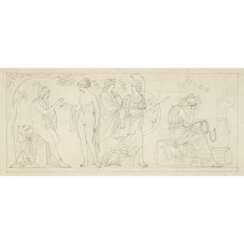



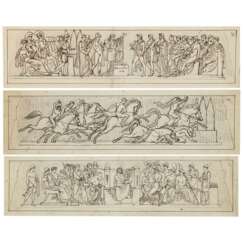

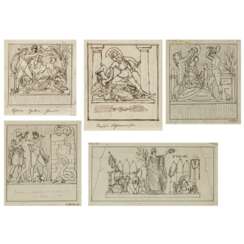



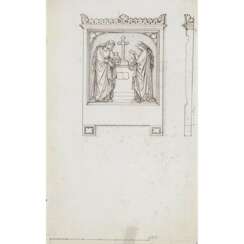

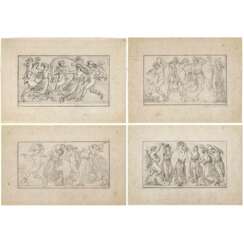





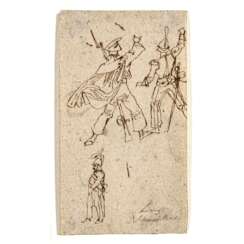



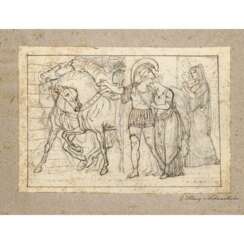

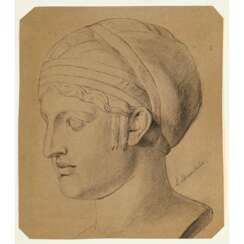











![Ludwig von Schwanthaler. "Justitia" - "Persefrantia" [?] - "Frömmigkeit" - "Sapienza"](/assets/image/picture_4353571/f0a1d/b4udob0c3kmi0hz5disfqkvqdb0qhcqmsazyheu8ax6b1i0takwqw2c0ma7u5die1731586047jpg__fix_374_244.jpeg)
![Ludwig von Schwanthaler. "Justitia" - "Persefrantia" [?] - "Frömmigkeit" - "Sapienza"](https://veryimportantlot.com/assets/image/picture_4353571/f0a1d/b4udob0c3kmi0hz5disfqkvqdb0qhcqmsazyheu8ax6b1i0takwqw2c0ma7u5die1731586047jpg__fix_374_244.jpeg)






